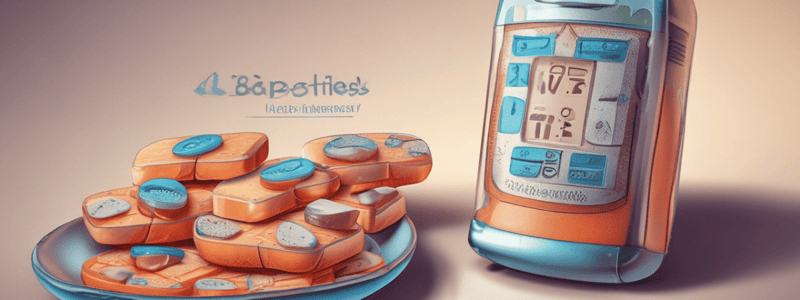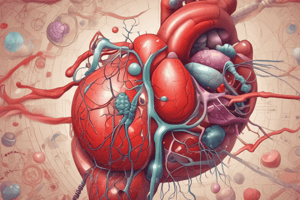Podcast
Questions and Answers
What is the primary mechanism of action of metformin?
What is the primary mechanism of action of metformin?
- Increases insulin secretion
- Blocks insulin receptors
- Increases glucose absorption in the intestines
- Decreases hepatic glucose production, decreases intestinal absorption of glucose, and improves insulin sensitivity (correct)
What is a common side effect of metformin?
What is a common side effect of metformin?
- Hypoglycemia
- Diarrhea (correct)
- Weight gain
- Headache
In which population is diabetes mellitus most commonly seen?
In which population is diabetes mellitus most commonly seen?
- Children
- Elderly
- Adults
- Both children and adults (correct)
What is a contraindication for the use of metformin?
What is a contraindication for the use of metformin?
What is the effect of metformin on weight?
What is the effect of metformin on weight?
What is the expected decrease in HbA1C with metformin?
What is the expected decrease in HbA1C with metformin?
What percentage of all problems involving the thyroid are due to diabetes mellitus?
What percentage of all problems involving the thyroid are due to diabetes mellitus?
Which of the following is a unique feature of biguanides?
Which of the following is a unique feature of biguanides?
What is the primary effect of metformin on insulin?
What is the primary effect of metformin on insulin?
What is the expected outcome of metformin therapy on HbA1C levels?
What is the expected outcome of metformin therapy on HbA1C levels?
Why is metformin contraindicated in severe renal dysfunction?
Why is metformin contraindicated in severe renal dysfunction?
What is a common nutritional deficiency associated with metformin therapy?
What is a common nutritional deficiency associated with metformin therapy?
What is the mechanism of action of Metformin?
What is the mechanism of action of Metformin?
What is the mechanism by which metformin decreases glucose levels in the blood?
What is the mechanism by which metformin decreases glucose levels in the blood?
What are the side effects of Metformin?
What are the side effects of Metformin?
What is the primary effect of metformin on glucose metabolism?
What is the primary effect of metformin on glucose metabolism?
Which of the following is NOT a characteristic of metformin?
Which of the following is NOT a characteristic of metformin?
Why is metformin contraindicated in severe renal dysfunction?
Why is metformin contraindicated in severe renal dysfunction?
What is the expected outcome of metformin therapy on body weight?
What is the expected outcome of metformin therapy on body weight?
What is a potential nutritional deficiency associated with long-term metformin therapy?
What is a potential nutritional deficiency associated with long-term metformin therapy?
What is the primary difference between DM1 and DM2?
What is the primary difference between DM1 and DM2?
What percentage of diabetes cases are accounted for by DM2?
What percentage of diabetes cases are accounted for by DM2?
What is the primary goal of oral treatment options in diabetes mellitus?
What is the primary goal of oral treatment options in diabetes mellitus?
Which of the following is a characteristic of DM1?
Which of the following is a characteristic of DM1?
What is the effect of metformin on intestinal glucose absorption?
What is the effect of metformin on intestinal glucose absorption?
Why is metformin contraindicated in severe renal dysfunction?
Why is metformin contraindicated in severe renal dysfunction?
What is the expected outcome of metformin therapy on HbA1C levels?
What is the expected outcome of metformin therapy on HbA1C levels?
What is a potential long-term effect of metformin therapy?
What is a potential long-term effect of metformin therapy?
What is the effect of metformin on hepatic glucose production?
What is the effect of metformin on hepatic glucose production?
Which of the following is a characteristic of biguanides?
Which of the following is a characteristic of biguanides?
What is the primary goal of oral treatment options in diabetes mellitus?
What is the primary goal of oral treatment options in diabetes mellitus?
What is a common nutritional deficiency associated with long-term metformin therapy?
What is a common nutritional deficiency associated with long-term metformin therapy?
Which of the following is a characteristic of DM2?
Which of the following is a characteristic of DM2?
What is the effect of metformin on weight?
What is the effect of metformin on weight?
What is the most abundant hormone produced by the thyroid gland?
What is the most abundant hormone produced by the thyroid gland?
What is the primary function of Calcitonin?
What is the primary function of Calcitonin?
What is the effect of thyroid hormones on the body?
What is the effect of thyroid hormones on the body?
What is the primary action of TRH?
What is the primary action of TRH?
What is the effect of Liothyronine (T3) on the body?
What is the effect of Liothyronine (T3) on the body?
What is the primary indication for the use of levothyroxine?
What is the primary indication for the use of levothyroxine?
What is the primary effect of thyroid hormones on the heart?
What is the primary effect of thyroid hormones on the heart?
What is the primary action of TSH?
What is the primary action of TSH?
What is the primary indication for the use of methimazole?
What is the primary indication for the use of methimazole?
What is the primary effect of thyroid hormones on the body's metabolism?
What is the primary effect of thyroid hormones on the body's metabolism?
Flashcards are hidden until you start studying
Study Notes
Diabetes Mellitus
- Diabetes Mellitus is a disease in which insulin, a hormone that secretes glucose for energy, is insufficient or ineffective.
DM1 vs DM2
- DM1 is often seen in children, also known as "Kitsis".
- DM2 accounts for 90% of all diabetes cases.
Oral Treatment Options
- Biguanides: a class of medications used to treat diabetes.
- Medication: Metformin.
- Mechanism of Action (MOA): decreases hepatic glucose production, decreases intestinal absorption of glucose, and improves insulin sensitivity.
- Effects:
- Weight Neutral.
- Lowers HbA1C by 1-2%.
- Side Effects:
- Diarrhea.
- Nausea.
- Flatulence.
- Vitamin B12 Deficiency, which can lead to anemia if left untreated.
- Clinical Pearls:
- Contraindicated in severe renal dysfunction (eGFR < 30 mL/min).
Diabetes Mellitus
- Diabetes Mellitus is a disease in which insulin, a hormone that secretes glucose for energy, is insufficient or ineffective.
DM1 vs DM2
- DM1 is often seen in children, also known as "Kitsis".
- DM2 accounts for 90% of all diabetes cases.
Oral Treatment Options
- Biguanides: a class of medications used to treat diabetes.
- Medication: Metformin.
- Mechanism of Action (MOA): decreases hepatic glucose production, decreases intestinal absorption of glucose, and improves insulin sensitivity.
- Effects:
- Weight Neutral.
- Lowers HbA1C by 1-2%.
- Side Effects:
- Diarrhea.
- Nausea.
- Flatulence.
- Vitamin B12 Deficiency, which can lead to anemia if left untreated.
- Clinical Pearls:
- Contraindicated in severe renal dysfunction (eGFR < 30 mL/min).
Diabetes Mellitus
- Diabetes Mellitus is a disease in which insulin, a hormone that secretes glucose for energy, is insufficient or ineffective.
DM1 vs DM2
- DM1 is often seen in children, also known as "Kitsis".
- DM2 accounts for 90% of all diabetes cases.
Oral Treatment Options
- Biguanides: a class of medications used to treat diabetes.
- Medication: Metformin.
- Mechanism of Action (MOA): decreases hepatic glucose production, decreases intestinal absorption of glucose, and improves insulin sensitivity.
- Effects:
- Weight Neutral.
- Lowers HbA1C by 1-2%.
- Side Effects:
- Diarrhea.
- Nausea.
- Flatulence.
- Vitamin B12 Deficiency, which can lead to anemia if left untreated.
- Clinical Pearls:
- Contraindicated in severe renal dysfunction (eGFR < 30 mL/min).
Diabetes Mellitus
- Diabetes mellitus is a condition where the body cannot produce or effectively use insulin, a hormone that secretes glucose for energy.
DM1 vs DM2
- DM1: typically develops in children and is a result of the body's inability to produce insulin.
- DM2: accounts for 90% of all diabetes cases and is a result of the body's ineffective use of insulin.
Oral Treatment Options for Diabetes
Biguanides
- Medication: Metformin
- Mechanism of Action (MOA): Decreases hepatic glucose production, decreases intestinal absorption of glucose, and improves insulin sensitivity.
- Effects:
- Weight neutral
- Lowers HbA1C by 1-2%
- Large drop in comparison to other medications
- Side Effects:
- Diarrhea
- Nausea
- Flatulence
- Vitamin B12 deficiency
- Clinical Pearls:
- Contraindicated in severe renal dysfunction (eGFR < 30 mL/min)
- Cannot be taken by anemic patients
Diabetes Mellitus
- Diabetes mellitus is a condition where the body cannot produce or effectively use insulin, a hormone that secretes glucose for energy.
DM1 vs DM2
- DM1: typically develops in children and is a result of the body's inability to produce insulin.
- DM2: accounts for 90% of all diabetes cases and is a result of the body's ineffective use of insulin.
Oral Treatment Options for Diabetes
Biguanides
- Medication: Metformin
- Mechanism of Action (MOA): Decreases hepatic glucose production, decreases intestinal absorption of glucose, and improves insulin sensitivity.
- Effects:
- Weight neutral
- Lowers HbA1C by 1-2%
- Large drop in comparison to other medications
- Side Effects:
- Diarrhea
- Nausea
- Flatulence
- Vitamin B12 deficiency
- Clinical Pearls:
- Contraindicated in severe renal dysfunction (eGFR < 30 mL/min)
- Cannot be taken by anemic patients
Diabetes Mellitus
- Diabetes mellitus is a condition where the body cannot produce or effectively use insulin, a hormone that secretes glucose for energy.
DM1 vs DM2
- DM1: typically develops in children and is a result of the body's inability to produce insulin.
- DM2: accounts for 90% of all diabetes cases and is a result of the body's ineffective use of insulin.
Oral Treatment Options for Diabetes
Biguanides
- Medication: Metformin
- Mechanism of Action (MOA): Decreases hepatic glucose production, decreases intestinal absorption of glucose, and improves insulin sensitivity.
- Effects:
- Weight neutral
- Lowers HbA1C by 1-2%
- Large drop in comparison to other medications
- Side Effects:
- Diarrhea
- Nausea
- Flatulence
- Vitamin B12 deficiency
- Clinical Pearls:
- Contraindicated in severe renal dysfunction (eGFR < 30 mL/min)
- Cannot be taken by anemic patients
Hormone Regulation
- GnRH (Gonadotropin-Releasing Hormone) regulates hormone secretion in the uterus
- TRH (Thyrotropin-Releasing Hormone) stimulates the release of TSH (Thyroid-Stimulating Hormone) from the anterior pituitary gland
Thyroid Hormones
- Calcitonin is the most abundant hormone in the thyroid gland
- T3 (Triiodothyronine) and T4 (Thyroxine) are produced by the thyroid gland
- T3 is used before thyroid surgery
- T4 cannot be used for weight loss and must be checked for thyroid levels
Thyroid Disorders
- Hyperthyroidism can be caused by cancer
- Treatments for hyperthyroidism include propylthiouracil, methimazole, or surgery
- BID (twice a day) and QD (once a day) are medication schedules for thyroid treatment
Pregnancy and Thyroid
- Thyroid storm can occur during pregnancy, causing weight gain, chills, and fever
Bone Health
- Phosphate is essential for bone health
- VitD is essential for Phos absorption, and diet plays a crucial role
- Ent (enteral nutrition) and Cart (cartilage health) are related to bone health
Anterior Pituitary
- The anterior pituitary gland regulates hormone secretion, including TSH
- Labor and vasoconstriction are related to anterior pituitary function
Studying That Suits You
Use AI to generate personalized quizzes and flashcards to suit your learning preferences.




